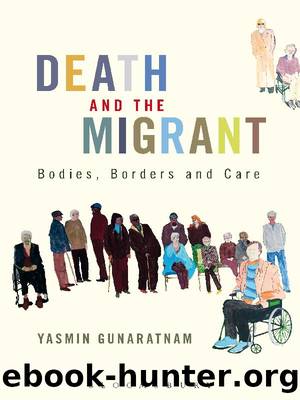Death and the Migrant by Gunaratnam Yasmin;

Author:Gunaratnam, Yasmin;
Language: eng
Format: epub
ISBN: 1538983
Publisher: Bloomsbury Publishing Plc
Published: 2013-12-14T16:00:00+00:00
10
Failing, Falling
About ten or so years ago, Denise Brady, the librarian at St Christopherâs Hospice, showed me an extraordinary article. The paper, by Margaret Clarke, Illora Finlay and Ian Campbell, published in 1991 in the journal Palliative Medicine, is a compelling, short account of the end-of-life care of a recent migrant to Wales. The article opens with a salutary warning, insinuating discomfort in the palliative care reader from the offset âIt is easy to develop a complacent smugness about our caringâ the authors write; the implication being that the acute vulnerability of dying can render patients and their loved ones overly grateful and uncritical.1 For these wounded healers, it is the failures of care that are the most instructive.
The story, told in just three pages, is about a Korean family that spoke some English and where the mother, who was the patient, spoke none at all. She had undergone a mastectomy in Korea four years previously, but there was no paperwork from her doctors so it had not been possible to establish what the mastectomy had been for. The woman had had one dose of chemotherapy in the United Kingdom, which was presumed to be for a recurrence of breast cancer. She appeared to have refused further treatment or follow-up care.
When the hospice consultant visited the family, on the request of the patientâs General Practitioner, the woman âwas lying flat on a board on the base of a single bed. She looked frightened and had obvious pain on movementâ. Her husband did not believe in Western medicine and had been administering faith healing. This had included the whole family fasting over the preceding three months. They ate fresh fruit, no animal products or vegetable carbohydrates. The three children aged five, 11 and 13 had been allowed bread and boiled vegetables. The husband consented to a hospice admission on the condition that the fast continued and that his wife would not be given any drugs.
An image of the womanâs chest X-ray on admission to the hospice is included in the article. It is described as showing âmultiple cavitating lesions with apical scarring consistent with advanced pulmonary tuberculosisâ.2 Analysis of the motherâs sputum was negative for acid-fast bacilli and for malignant cells. âHer country of origin, the lack of documented histology of the mastectomy and her clinical state suggested a possible diagnosis of TBâ, the authors tell us. During the early days of her hospice stay, the husband had continued to refuse analgesia on his wifeâs behalf. He subsequently agreed to one mg diamorphine intravenously every four to six hours and to liquid vegetarian dietary supplements. Communication with the family was impeded by language differences, further compounded by tensions with local interpreters whose help they had rejected on previous occasions.
The woman was given antituberculous therapy and improved during the first four days of treatment. She collapsed suddenly on the sixth day âbecoming rapidly shocked, clinically comparable with a Herxheimer reactionâ (where a body eliminates toxins at a fast rate). In the last hours of her life the family sang hymns.
Download
This site does not store any files on its server. We only index and link to content provided by other sites. Please contact the content providers to delete copyright contents if any and email us, we'll remove relevant links or contents immediately.
For Baby's Sake(4317)
Spare by Prince Harry The Duke of Sussex(4195)
Tuesdays with Morrie by Mitch Albom(3832)
Never by Ken Follett(2880)
The Five People You Meet in Heaven by Mitch Albom(2841)
Machine Learning at Scale with H2O by Gregory Keys | David Whiting(2290)
The Clitoral Truth: The Secret World at Your Fingertips by Rebecca Chalker(2242)
Tuesdays With Morrie by Mitch Albom(2172)
Fairy Tale by Stephen King(2069)
Will by Will Smith(2041)
Reminders of Him: A Novel by Colleen Hoover(1879)
Borders by unknow(1785)
The Body Keeps the Score by Bessel van der Kolk MD(1711)
Cruel to Be Kind by Cathy Glass(1667)
Finding Chika by Mitch Albom(1647)
The Stranger in the Lifeboat by Mitch Albom(1532)
Friends, Lovers, and the Big Terrible Thing by Matthew Perry(1327)
New Morning Mercies: A Daily Gospel Devotional by Paul David Tripp(1323)
A Short History of War by Jeremy Black(1300)
